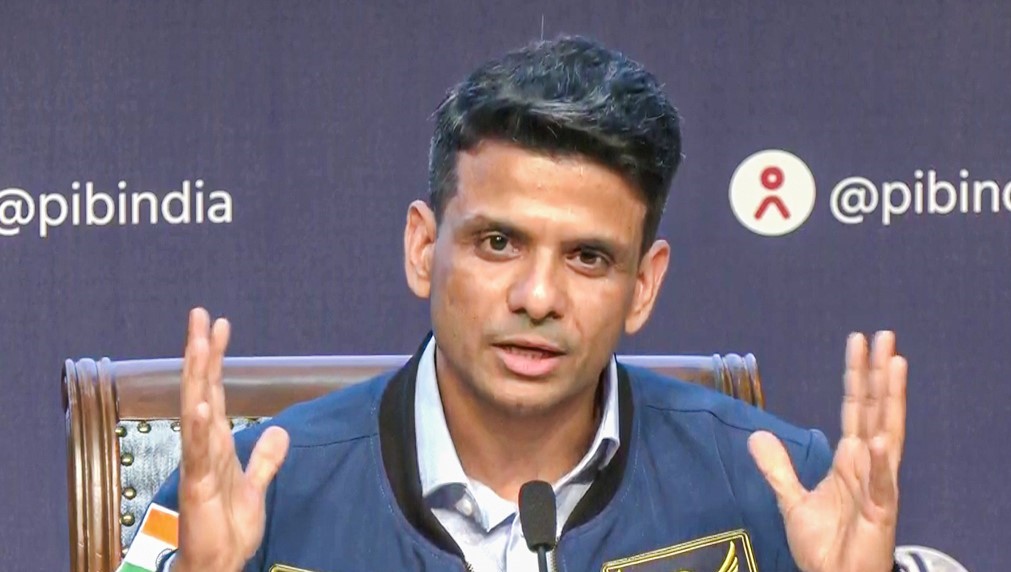Indian Air Force Group Captain Shubhanshu Shukla on Thursday described his 18-day mission aboard the International Space Station (ISS) as “a journey of 140 crore Indians,” highlighting the significance of India’s advancing human spaceflight programme.
Addressing a press briefing in Delhi, Shukla said, “I would like to thank every citizen of this country who behaved in a way that made it feel like they actually owned this mission. I truly felt that this was a mission for the entire nation.”
Shukla, who served as the mission pilot, became the first Indian to travel to the ISS as part of Axiom Space’s U.S.-based Ax-4 mission, which included astronauts from the United States, Poland, and Hungary. He returned to Earth on July 15 and arrived back in India on August 17 after completing a month-long rehabilitation programme in the U.S.
Shukla acknowledged the government and ISRO’s role in making the mission possible. “I would like to start by thanking the people who have made this mission possible. There are multiple layers to this, not just one person. I will start by thanking the Government of India for conceiving the mission and finally making it happen. I would like to thank ISRO for enabling this entire mission. The people, my colleagues at ISRO, who have worked so hard for successfully executing this mission,” he said.
The Indian astronaut described his time on the ISS as “very different from what you learn on the ground. It was an unbelievable experience.” His stay included several experiments led by ISRO and other activities aboard the orbital lab.
“Crew Dragon is one of the three vehicles that can currently take humans to space. We were also fortunate to have training on the Soyuz, which launches from Russia, as well as on Crew Dragon. The ISS, as you know, is an orbiting laboratory that has been operational since 2000. It has been conducting cutting-edge science and is actually a perfect example of international collaboration,” he added.
Shukla said his experience piloting the Axiom-4 mission would be crucial for India’s upcoming Gaganyaan human spaceflight programme. “This is just the first step in Bharat’s journey of human spaceflight,” he said.
Describing the view from space, he said, “Bharat aaj bhi Antariksh se saare jahaan se achha dikhta hai.” He added, “The supplementary knowledge we get just by being there is invaluable. All the information I have collected in the past year will be extremely useful to us for our own missions, Gaganyaan and Bharatiya Antariksh Station. Very soon we shall send someone from our capsule, from our rocket and our soil.”
On the physical challenges of space, Shukla said, “The body goes through a lot of changes. The body forgets how to live in gravity after spending 20 days in space.”
He highlighted his technical role as mission pilot aboard the Crew Dragon spacecraft, launched by SpaceX’s Falcon 9 rocket. “There are four seats in the Crew Dragon. I was the mission pilot and I had to work with the commander and interact with the systems of the Crew Dragon. We had to perform the experiments that were conceived, developed and realised by the Indian researchers. And also to perform STEM demonstrations, capture photos and videographs.”
Shukla said the mission had been “extremely successful” and added: “Execution of such a mission gives a lot of knowledge that cannot be measured or documented.”
Defence Minister Rajnath Singh met Group Captain Shubhanshu Shukla in New Delhi on Thursday, congratulating him on his achievement and calling it a major milestone in India’s human spaceflight journey. Singh acknowledged Shukla’s contribution through vital scientific experiments conducted in orbit and praised his role in advancing India’s space research capabilities. He expressed confidence that the astronaut’s journey will inspire young minds to pursue careers in science, technology, and space exploration.














